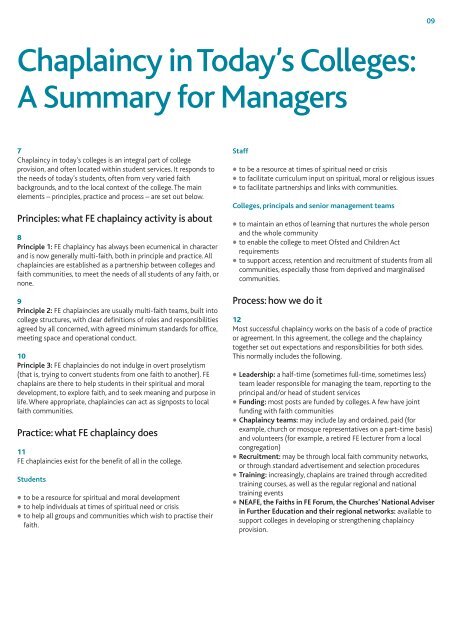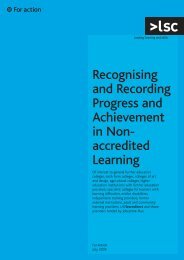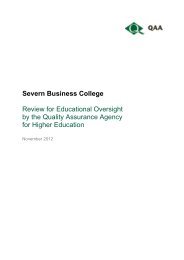Faiths and further education - Church of England
Faiths and further education - Church of England
Faiths and further education - Church of England
- No tags were found...
You also want an ePaper? Increase the reach of your titles
YUMPU automatically turns print PDFs into web optimized ePapers that Google loves.
09Chaplaincy in Today’s Colleges:A Summary for Managers7Chaplaincy in today’s colleges is an integral part <strong>of</strong> collegeprovision, <strong>and</strong> <strong>of</strong>ten located within student services. It responds tothe needs <strong>of</strong> today’s students, <strong>of</strong>ten from very varied faithbackgrounds, <strong>and</strong> to the local context <strong>of</strong> the college.The mainelements – principles, practice <strong>and</strong> process – are set out below.Principles: what FE chaplaincy activity is about8Principle 1: FE chaplaincy has always been ecumenical in character<strong>and</strong> is now generally multi-faith, both in principle <strong>and</strong> practice.Allchaplaincies are established as a partnership between colleges <strong>and</strong>faith communities, to meet the needs <strong>of</strong> all students <strong>of</strong> any faith, ornone.9Principle 2: FE chaplaincies are usually multi-faith teams, built intocollege structures, with clear definitions <strong>of</strong> roles <strong>and</strong> responsibilitiesagreed by all concerned, with agreed minimum st<strong>and</strong>ards for <strong>of</strong>fice,meeting space <strong>and</strong> operational conduct.10Principle 3: FE chaplaincies do not indulge in overt proselytism(that is, trying to convert students from one faith to another). FEchaplains are there to help students in their spiritual <strong>and</strong> moraldevelopment, to explore faith, <strong>and</strong> to seek meaning <strong>and</strong> purpose inlife.Where appropriate, chaplaincies can act as signposts to localfaith communities.Practice: what FE chaplaincy does11FE chaplaincies exist for the benefit <strong>of</strong> all in the college.Students• to be a resource for spiritual <strong>and</strong> moral development• to help individuals at times <strong>of</strong> spiritual need or crisis• to help all groups <strong>and</strong> communities which wish to practise theirfaith.Staff• to be a resource at times <strong>of</strong> spiritual need or crisis• to facilitate curriculum input on spiritual, moral or religious issues• to facilitate partnerships <strong>and</strong> links with communities.Colleges, principals <strong>and</strong> senior management teams• to maintain an ethos <strong>of</strong> learning that nurtures the whole person<strong>and</strong> the whole community• to enable the college to meet Ofsted <strong>and</strong> Children Actrequirements• to support access, retention <strong>and</strong> recruitment <strong>of</strong> students from allcommunities, especially those from deprived <strong>and</strong> marginalisedcommunities.Process: how we do it12Most successful chaplaincy works on the basis <strong>of</strong> a code <strong>of</strong> practiceor agreement. In this agreement, the college <strong>and</strong> the chaplaincytogether set out expectations <strong>and</strong> responsibilities for both sides.This normally includes the following.• Leadership: a half-time (sometimes full-time, sometimes less)team leader responsible for managing the team, reporting to theprincipal <strong>and</strong>/or head <strong>of</strong> student services• Funding: most posts are funded by colleges.A few have jointfunding with faith communities• Chaplaincy teams: may include lay <strong>and</strong> ordained, paid (forexample, church or mosque representatives on a part-time basis)<strong>and</strong> volunteers (for example, a retired FE lecturer from a localcongregation)• Recruitment: may be through local faith community networks,or through st<strong>and</strong>ard advertisement <strong>and</strong> selection procedures• Training: increasingly, chaplains are trained through accreditedtraining courses, as well as the regular regional <strong>and</strong> nationaltraining events• NEAFE, the <strong>Faiths</strong> in FE Forum, the <strong>Church</strong>es’ National Adviserin Further Education <strong>and</strong> their regional networks: available tosupport colleges in developing or strengthening chaplaincyprovision.
















